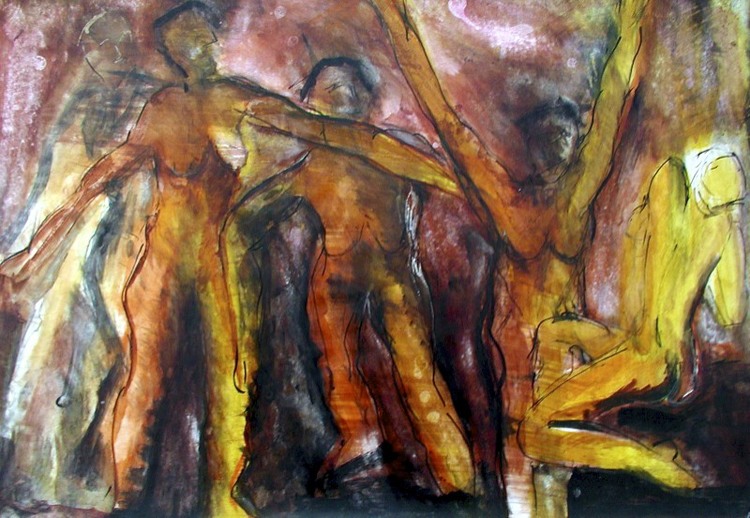This year, URI Providence Campus Arts and Culture Program and the Women’s Fund of Rhode Island present a very special Women’s History Month Exhibit: RADICAL WOMEN: Politically Engaged Art through March 27. Director Steven Pennell has taken this opportunity to curate a show that revels in the powerful force and vision of the female mind. ”Every year I curate an exhibit to recognize Women’s History Month…this exhibit is in recognition of the 100th Anniversary of the 19th Amendment giving women the right to vote. Thirty area artists were invited to provide up to five works in a variety of media. I chose them not simply because they were artists who were women, but rather because they were artists who had something important to say and happened to be women….there is an underlying narrative that is politically and socially conscious.”
That narrative is strong and richly textured, with an impact that is defined far more by the strength of each individual artist than by gender. The works range from fragile fiberwork and marble to digital design, from deeply serene paintings to large canvases seething with passion. The diversity makes this a show that pulls viewers along. Rebecca Siemering’s The Well-Suited Senator, a costume composed of precision cut text and photos sewn onto felt, could compete for top prize on “Project Runway,” while in Bare Branch Bonfire in January Sun, a mixed media collage by Susan Garland, emotions combust like dry tinder into flame. In a central window, Garland’s mixed media sculpture, Piercing Armour is suspended, its earthen and rusted heavy surface broken by roots and worms, above a row of delicate and beautifully crafted mixed media vessels by Roberta Uhlmann set upon a pristine shelf.
There are quiet touches – a tender and ethereal quality haunts Melanie Ducharme’s Taking Care of Her, where a glowing orb lies in dark fecund ground, a cluster of deep blue flowers nestled by its side – and distinctly female themes dominate some of the pieces. Carol Scavotto’s theme of rebirth is redolent with egg forms and embryos, and Sarina Mitchel’s mixed media Inner Light 1 seems a giant homage to the vagina. But the female form itself is not worshipped. In fact, the artists here seem to throw the notion of the traditional nude right back in our face. Justine Johnson’s intriguingly seductive black and white photographs both invite and taunt the viewer, while Denyse Wilhelm’s wax sculpture, Diety, stares challengingly at viewers, as if daring us to question her. Eirinn Byrns’s Boudoir #1 is a quiet study in form; yet the modestly draped figure has turned her back on us and will not show her eyes.

A particularly powerful piece in the show, Monique Johnson’s portrait, Don’t Let Nobody Turn You Around Mahalia Jackson, carries with it not only the weight and force of Mahalia herself, but also the entire history of the weary souls that trudged up the dark hill before her. All of Johnson’s subjects from musical history are beyond portraits; they are a description of a way of life. The ravages of social and cultural forces are seen in Judy Volkman’s Spoken: a woman’s eyes seem closed as if in prayer, but her upturned face is drenched with strokes of red that drip from her mouth like blood. In Volkman’s Black Lives Matter, there is raw fear in the twisted lines of this face, but also a deep defiance.
As viewers move along, the mood shifts and changes – in Tamara Diaz’s paintings, the colors are sunny, the style of her work rooted in both Pop Art and Caribbean culture and folk art. In Sirarpi Walzer’s mixed media painting, Sprite, a form seems to dance across the canvas, wrapping itself in layers of brilliant hues as it goes. Then suddenly the air turns cold before the chilly panels of Kristin Street’s Aerial Aquifers Connecting Outposts on a Grid” #1 – #4. The art in this show boxes the compass, representing a kaleidescope of issues and views. The exhibit also includes work by Nadine Almada, Valerie Alvarado, Carolina Arentsen, Lin Collette, Lilian R. Engel, Margaret Hart, Annie Kennedy, Saberah Malik, Amie Noakes, Dianne Reilly, Hannah Ressiger, Monique Rolle-Johnson, Jacqueline Sylvia, Zoey Stites, Kristin Street, and Robyn Thomas.
Along with the paintings, this exhibit was scheduled to include a performance by OutLoud Theatre on March 20: Politically Engaged: The Most Massive Woman Wins, by Madeleine George, along with a politically engaged panel discussion on March 26. Due to the restrictions precipitated by COVID 19, these were cancelled. It is probable that many people will not see the exhibit for those same reasons, but I encourage all of you to safely make the effort. Woman’s History Month comes but once a year, and these works deserve to be seen.
For more information, and upcoming exhibits, visit uri.edu/ceps/prov/arts or follow on twitter @URIprovarts
